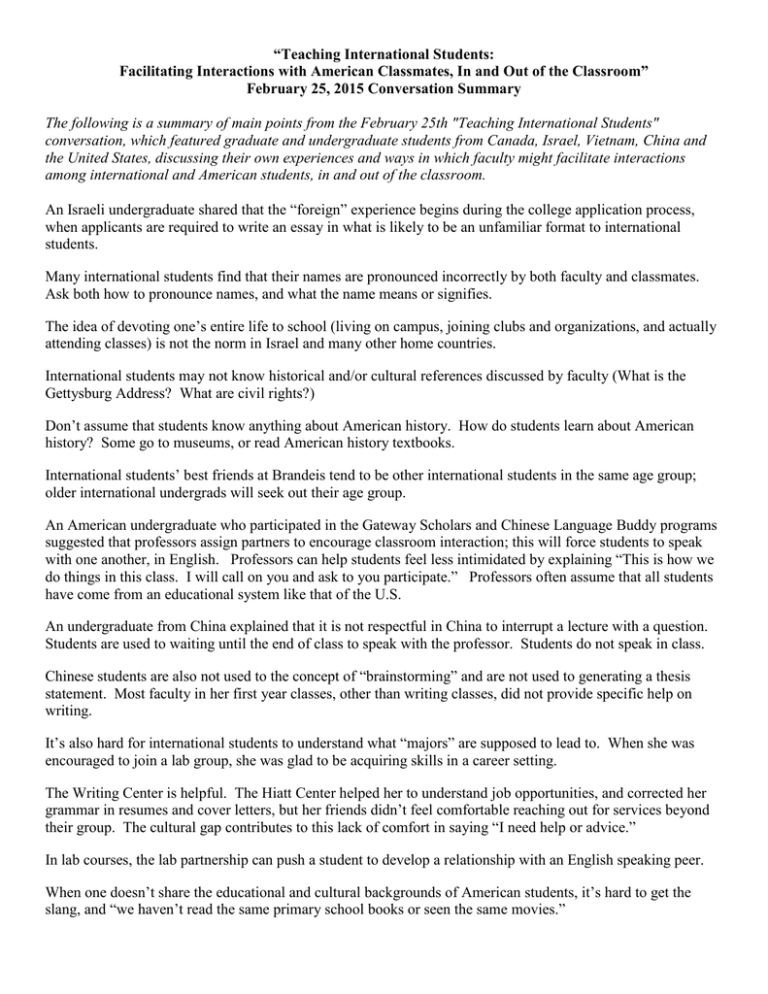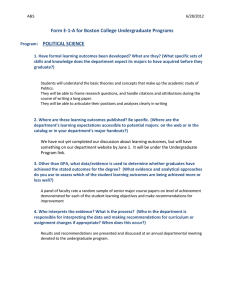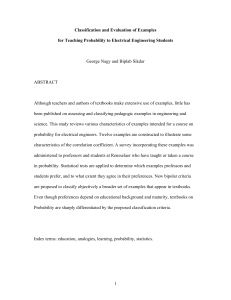“Teaching International Students:
advertisement

“Teaching International Students: Facilitating Interactions with American Classmates, In and Out of the Classroom” February 25, 2015 Conversation Summary The following is a summary of main points from the February 25th "Teaching International Students" conversation, which featured graduate and undergraduate students from Canada, Israel, Vietnam, China and the United States, discussing their own experiences and ways in which faculty might facilitate interactions among international and American students, in and out of the classroom. An Israeli undergraduate shared that the “foreign” experience begins during the college application process, when applicants are required to write an essay in what is likely to be an unfamiliar format to international students. Many international students find that their names are pronounced incorrectly by both faculty and classmates. Ask both how to pronounce names, and what the name means or signifies. The idea of devoting one’s entire life to school (living on campus, joining clubs and organizations, and actually attending classes) is not the norm in Israel and many other home countries. International students may not know historical and/or cultural references discussed by faculty (What is the Gettysburg Address? What are civil rights?) Don’t assume that students know anything about American history. How do students learn about American history? Some go to museums, or read American history textbooks. International students’ best friends at Brandeis tend to be other international students in the same age group; older international undergrads will seek out their age group. An American undergraduate who participated in the Gateway Scholars and Chinese Language Buddy programs suggested that professors assign partners to encourage classroom interaction; this will force students to speak with one another, in English. Professors can help students feel less intimidated by explaining “This is how we do things in this class. I will call on you and ask to you participate.” Professors often assume that all students have come from an educational system like that of the U.S. An undergraduate from China explained that it is not respectful in China to interrupt a lecture with a question. Students are used to waiting until the end of class to speak with the professor. Students do not speak in class. Chinese students are also not used to the concept of “brainstorming” and are not used to generating a thesis statement. Most faculty in her first year classes, other than writing classes, did not provide specific help on writing. It’s also hard for international students to understand what “majors” are supposed to lead to. When she was encouraged to join a lab group, she was glad to be acquiring skills in a career setting. The Writing Center is helpful. The Hiatt Center helped her to understand job opportunities, and corrected her grammar in resumes and cover letters, but her friends didn’t feel comfortable reaching out for services beyond their group. The cultural gap contributes to this lack of comfort in saying “I need help or advice.” In lab courses, the lab partnership can push a student to develop a relationship with an English speaking peer. When one doesn’t share the educational and cultural backgrounds of American students, it’s hard to get the slang, and “we haven’t read the same primary school books or seen the same movies.” Faculty can break the ice in the classroom. A graduate student from Vietnam who received his undergraduate degree in Russia said that if a professor asked the meaning of his name, it left a positive impression with him. Professors can be role models for good interaction. Don’t group international students together. A Canadian grad student and native English speaker, who had completed all his IB exams in French, was used to speaking up in class, and being more casual with professors than are his American classmates. In his undergraduate and MA classes, he was on a first name basis with his professors. In the U.S., he had to change his writing style, which in French used a more passive voice. As an instructor in a Leader Scholar Community (for first year students who live on the same floor and are all enrolled in an experiential learning practicum), he begins each weekly class session with an ice breaker so that all are on the same page, and all have felt “ridiculous” together. He aims for everyone to feel comfortable with one another and with himself as the instructor. He also tells students “I’m going to be doing all these things, such as calling on you.” He explains “why we work in groups.” Advisors often don’t understand the process of “naturalization” for international students. International students who haven’t secured an American job right after they graduate must return to their home countries. Faculty should remember that students who ask for career advice know that they will be forced to leave the US if they do not have a job secured after graduation. All students have hesitation about choosing majors, but it’s harder for international students, because they don’t have the safety net of not having to know what they are doing right after college. Career paths and markets in the US differ from those in home countries. Students are often under a lot of pressure from parents about course choice. Parents are often choosing both courses and majors. When a student asks “How am I going to get an A in your course?” it might be coming from parental pressure. Provide students practice with writing. Remember that everyone has their own story, and that we should be encouraged to learn about one another’s stories. Explain the syllabus. Explain the way in which participation is graded. Explain how grades are determined. Explain that “A” students in the US read the syllabus. Include rubrics and explain the standard for each rubric. Ask what’s unclear in the syllabus. Understand the significance of just reaching out to one another--domestic and internationals students alike, student to student, faculty with student. Stop worrying so much about offending each other. Reach out; ask how to pronounce names, or what a name means. Most people really enjoy sharing their stories with others, and love to be asked. Do try to be explicit about expectations as much as possible, and about how meeting them (for participation, writing especially) is more work for some students than others. Do make students work in assigned groups so they'll all talk with more different people in class.




